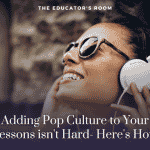Have you signed up for The Educator’s Room Daily Newsletter? Click here and support independent journalism!
For many students, music is part of their everyday lives. They constantly have AirPods in, nod their heads and tap their feet when they hear a beat, and use music to make themselves feel better if they’re feeling down. However, many of those same students do not feel welcome in music programs. They don’t sign up for singing lessons or join the band. If there is a mandatory music elective, students who claim to like music often say they do not want to be in the class. “I like listening to music and dancing at home,” one student said to me, “but music in school is boring.” Alternatively, I often have students who enjoy my general music class, but when I encourage them to join the band or choir, they say, “No, that’s not for me.” I ask them why, and often the reply is something along the lines of, “I’m just not a music kid.”
Why is it that so many students who like music do not want to be in music class? One of the reasons may have to do with the elitist nature of music education. Many music teachers were raised to learn music in a traditional, classical form. Then they use that early training as the standard for music education. As a result, they cut off students who want to participate but don’t necessarily want to pursue music as a career. Teachers need to recognize when a music program may be becoming elitist and advocate for music learning in all its forms.
Not All Music Students Want Music Careers
It is certainly important for music teachers to instill quality musicianship skills in their students. Dr. Neil Wetzel, professor of music at Moravian University said via email, “Music teachers need to be ready to prepare students for careers in music and music education, and need to possess and understand the tools and skills needed to be a musician.” However, it’s important to realize that not every student who enters our classroom will want to pursue a career as a musician, and our job is just as important for those students. Especially after the pandemic, with many musicians struggling to make ends meet financially, music seems less and less like a viable career path. This puts music teachers in a new position – one where our job of teaching music appreciation is equally as important as teaching musical skills. Over my years as a music teacher, I’ve noticed that many students are simply looking for a way to connect and develop their interests. Those musical interests may look nothing like mine when I was their age.
Music Education Needs to Be Relevant and Current
Students today want to learn about music in non-traditional ways. For decades, music teachers have focused on note-reading skills, teaching scales, learning to play traditional instruments such as piano or trumpet, and music history that dates back to the 18th century. Many who come into my classroom have no interest in learning to read music. They just like how music makes them feel and want to explore that. However, focusing on traditional skills often makes music seem inaccessible to them. One music educator found that in his high school, only 15% of students participated in music. A focus on traditional, teacher-led music classes made the program exclusive and uninviting to newcomers. “I couldn’t shake the idea that our department wasn’t serving 85% of the student population,” he writes. “This was simply not acceptable to me.” As a result of programs like these, music ensembles tend to fill up only with students who have been studying privately for years.
Music Education Needs to Be Equitable and Accessible
This leads to another problem: access. Since ensembles fill up mostly with students who have studied privately, they fill up with students who have had financial access to private lessons. That often means there is a lack of racial and socioeconomic diversity in our school music ensembles. Another access issue relates to transportation. I have had several students whose families are struggling financially; both parents work full time and cannot pick them up from after-school ensembles (in my years as a choir teacher, this is the number one reason why students have missed concerts).
While not always the case, studies show that “privileged groups are overrepresented, in terms of race, socioeconomic status, English fluency, and parents’ education level.” One study showed that only about 6 percent of all students who earn Bachelor’s degrees in music are Black. This inequity is what makes elitism so problematic. The focus on very old European composers and their subsequent rules for music structure makes music education unrelatable not only for many students of color but also for many young people in general who have not had the opportunity to study privately. One possible solution to elitism in music education is culturally responsive teaching. It’s important to teach music “where kids are, and with what interests them.” Recognizing this will help us make music accessible for students of all races and backgrounds.
How to Avoid Elitism in Music Education
Student-Centered Goal Setting
The question remains – how can teachers maintain high expectations for all students without reverting to elitism? First, teachers should set challenging yet carefully worded goals to be inclusive of students’ desired outcomes. This clarity is especially important in general music classes. Teachers should orient goals towards furthering student enjoyment and encouraging participation. Even in a band, teachers can adapt goals in ways that focus more on expression or understanding of music as a whole, how it tells a story and how it affects our emotions. These things are essential pieces of learning for students.
Growth Mindset Focused Praise
Teachers can also avoid elitism by using praise carefully. Experts note that praising ability “conveys a fixed mindset – i.e., the belief that abilities are simply fixed.” Praising or commenting on a student’s musical ability only references the skills as they have acquired up to that point, focusing on the past. These skills were not necessarily acquired through greater talents than others but by having financial privilege, which enabled them to take lessons. This type of praise reinforces the idea that privileged (often white or wealthy students) are the only ones who should participate in music.
Praising or commenting on a student’s approach to a piece of music enables them to focus on the future and its possibilities, regardless of their prior learning. Praising effort helps prevent an imbalance of praise based on wealth or privilege. I often say something like, “I love how you recognized where the mistake was but shook it off and kept going,” or, “You were clearly focusing very hard that time. I’m impressed.” Music teachers can offer similar comments to anyone regardless of prior learning. I believe this helps all students to feel fulfilled as they strive to get better. Praising the process instead of the outcome will make music ensembles seem less scary, and enjoyable musical experiences will appear more attainable. This approach to praise ensures that students who have not had the privilege of private lessons still feel worthy of being a part of music class.
Let’s Make Music Education Accessible for Everyone
Music education should be available to everyone. Music teachers need to be experts in their craft to serve as positive musical role models. Yet, we cannot let that lead us down a path that cuts off half of our student population. A free music program in a public school is truly wasted if we do not make it accessible to all. Students need to feel like music is attainable, not something elite beyond their talent level. Music teachers can and should make music class a place where all students, regardless of ability or career intent, can come and feel welcome.

Faith Brown is a writer and educator with a Bachelor’s degree in music education from Moravian University, where she also received multiple prizes for academic essays. Throughout six years of teaching, she has worked on an initiative for social emotional learning, served as an active member of her district’s equity council, and led multiple professional development sessions on mindfulness. She is currently working on her 200-hour yoga teacher certification and continues to teach music.
Editor’s Note: If you enjoyed this article, please become a Patreon supporter by clicking here.






